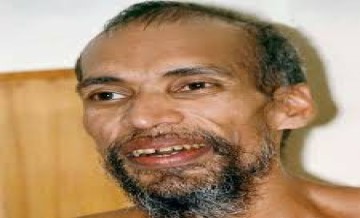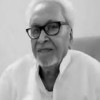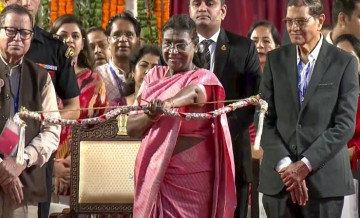Spiritual Guru united science, peace, and non-violence in harmony

Shree Mahaveer ji (Rajasthan) Shobhna Jain/ Anupma Jain 27April 25 (VNI) Winds were blowing softly and gently. The morning sun’s rays were not only illuminating the Shikhar of the Digambar Jain Temple at Shree Mahaveerji—crafted in red sandstone—but also bathing the entire marble-clad complex in a golden, sacred glow. The atmosphere was steeped in divinity. From within the temple, the sound of devotees chanting prayers and sacred mantras echoed through the air, filling every corner with pure, divine vibrations.
Muni Shri, who had earned an M.Tech degree from Sagar University, chose to renounce all worldly ties, comforts, and material possessions at the tender age of 23. Instead of stepping into a career or family life, he walked the sacred path of renunciation, embracing the strict life of a Digambar Jain monk. It is truly remarkable to witness such a highly educated soul choose a life of spiritual austerity and profound detachment.
Muni Shri—a poet, philosopher, and thinker with a deeply scientific mind—embodies a vision where science and spirituality are not opposing forces, but complementary streams leading toward truth. His thoughts resonate with timeless relevance, blending ancient wisdom with modern insight.
Inside the temple, his discourses continued. Devotees listened with deep reverence, fully absorbed. Even my own steps, like those of many others, were stilled by the sheer pull of his words. In his resonant voice, Muni Shri spoke of the essential need to live a life rooted in non-violence—not merely as a belief, but as a way of being.
To manifest non-violence, he said, one must first become self-reliant. We must use our resources judiciously, avoiding all forms of wastage—be it water, material goods, or the endless desires fueled by materialism. He spoke with deep compassion, urging us to respond positively in every circumstance, to resist letting selfish motives corrupt our relationships or goals—for these are the seeds from which violence, whether in thought, word, or deed, takes root.
He cautioned that whenever we allow violent tendencies to grow—whether silently or openly—we stray from the path of peaceful coexistence. Thus, it becomes imperative to guard against making violence part of our conduct. “The emotions we nurture within,” he said, “shape the destiny of our lives.” Hence, constant self-examination is vital.
Muni Shri’s life is an extraordinary testament to sacrifice and penance. Perhaps it is the profound presence of such a luminous personality that has etched that sacred morning in my heart forever. To see such a highly educated being choose the austere life of a Digambar Jain monk before even stepping into the world of careers, comfort, and family life is a rare and blessed vision.
Many monks in Acharya Vidyasagar Ji’s sangha, including Muni Shri, are highly educated. Inspired by his ideals, the ‘Maitri Group,’ formed in 2001, actively promotes higher education alongside the spread of ethical values among youth. They have also lovingly taken up the responsibility of preserving and disseminating his thought-provoking discourses and poetry.
Muni Shri’s poems are not mere verses; they awaken new consciousness, sowing seeds of introspection and spiritual strength. In one such poem, a small bird delivers a message profound for all humanity:
“I asked the bird:
The sky is boundless—
Are you not afraid of losing your way?
The bird replied:
I know how to return home.”
Through this simple yet powerful analogy, he calls for the creation of a fearless society—one in which all beings participate equally in the spirit of peaceful coexistence.
As he finished his discourse, Muni Shri invited us to imagine a world where everyone lives without fear, where peaceful coexistence reigns supreme, and where non-violence becomes the key element of human interaction. His vision feels even more urgent and relevant in today’s troubled world. He left us with these tender lines from another poem:
“I must still walk slowly, very slowly,
For I can still hear the sound of my own footsteps.”
In those quiet words lies an eternal message—to tread gently, consciously, and compassionately upon this earth, in harmony and peaceful coexistence.
No comments found. Be a first comment here!















